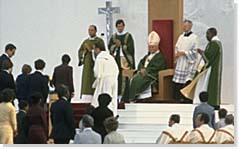4. The Papacy and Infallibility

Roman Catholicism teaches the dogma of the infallibility of the Roman pontiff. This was not declared by the Roman Catholic Church until the year 1870. Yet through the Church’s motto of Semper idem (“Always the same”), it is claimed that the Church has always held this, going back to the first Pope, the Apostle Peter! (Catechism 80-82, 85).
The pope, as the vicar (deputy, substitute for, representative) of Christ, is considered infallible only when he speaks “ex cathedra” (“from the chair”). But, as the reference below makes very clear, this tradition, along with other traditions of the Roman Catholic Church, is considered to be as authoritative as the Scriptures.
As a result the Church, to whom the transmission and interpretation of Revelation is entrusted, does not derive her certainty about all revealed truths from the holy Scriptures alone. Both Scripture and Tradition must be accepted and honoured with equal sentiments of devotion and reverence. —Catechism 82 (emphasis added)
Thus, for the Roman Catholic, submission to the formal teaching of the Roman Catholic Church’s tradition is as important as submission to the Scriptures.
The Protestant Reformation restored to the body of Christ the doctrine of sola scriptura (“Scripture alone”). The Roman Catholic faith has shown a willingness to raise the pope above Jesus Christ and the Bible by giving him the right to nullify Scripture through papal decrees. The conscience of the biblical Protestant (like that of Martin Luther) is bound by the Bible alone. “The Scriptures of the Old and New Testaments are the Word of God, the only infallible rule for faith and life.” It cannot be both ways. The traditions of the churches are often of value. But these traditions must always be subordinate to, and constantly corrected by, the Scriptures, which alone are the Word of God.
See: THE POPE OR THE HOLY SPIRIT—Who is the true “Vicar of Christ”? Answer
Previous page in this article | Next page in this article


Pages in this complete article about ways in which the Bible and the Roman Catholic Church differ
1. Salvation through Faith by Grace Alone | 2. Salvation in Christ Alone | 3. Mary | 4. Pope and Infallibility | 5. The Mass | 6. Purgatory | 7. The Priestly System and Other Differences | 8. Conclusion
